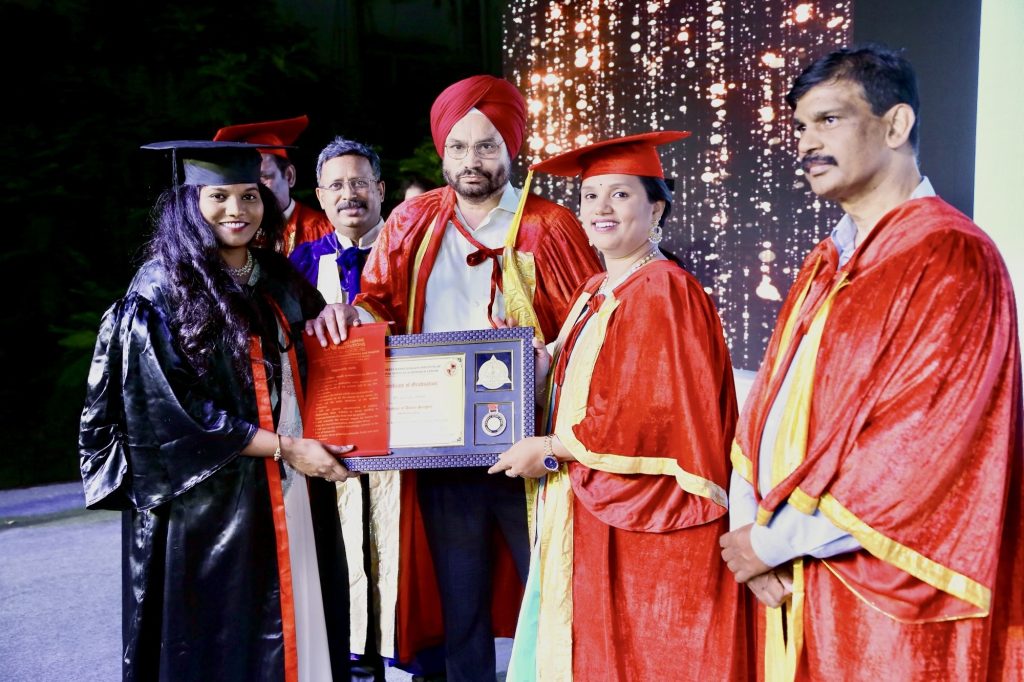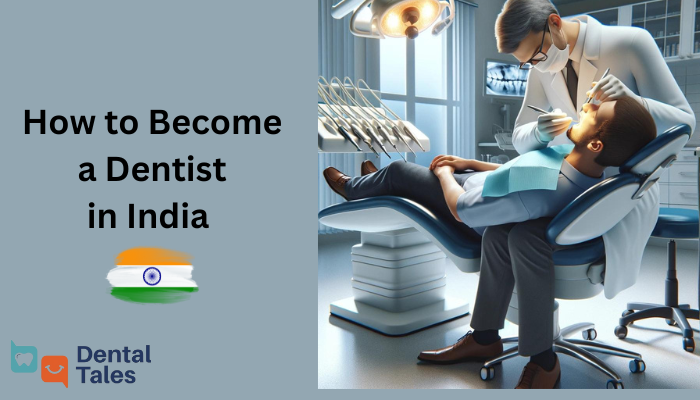A dentist is a medical professional qualified and trained to treat diseases and other conditions affecting the teeth and gums, such as tooth decay, bleeding gums, sensitivity, bad breath, broken teeth, etc. In India, where smiles are a universal language of hospitality, becoming a dentist can be particularly rewarding. You will be immensely satisfied with treating and improving patients’ oral health.
I’m a dentist who graduated from Panineeya Dental College, Telangana, India. Here are the steps I took that helped me on my journey to becoming a dentist. They might also make yours smoother. This blog post will be your one-stop guide to becoming a dentist in India. We’ll explore a step-by-step guide to the educational qualifications, entrance exams, essential skills, and career options available.
How to Become a Dentist in India
Dentistry in India is a flourishing field. Many students choose BDS after MBBS. Growing awareness of oral health is leading to an increased demand for dental services. To become a dentist in India, you need rigorous education and dedication.
Educational Requirements
Ready to Become a Dentist? Here are the educational qualifications required to pursue a career in dentistry
Step 1: Complete 10+2 with Science
The first step is to finish your higher secondary education (10+2) from a recognized educational board with Physics, Chemistry, and Biology (BiPC) as your main subjects. The dental school requires candidates to score well in these science subjects.
Step 2: Clear the NEET Examination
The National Eligibility cum Entrance Test (NEET) is a mandatory entrance exam for admission to dental colleges in India. This exam assesses your Physics, Chemistry, and Biology knowledge. Scoring well on this exam is crucial for securing a seat in a reputable dental college. This exam is highly competitive, and securing a seat in a top dental college often requires strong performance with a high score. After the exam, admission to dental school is done by counseling; students can select their preferred dental college based on their score.
Step 3: Earn Your BDS Degree
After qualifying for NEET, you can be admitted to a dental school. The BDS course is a five-year program, with four years of academic study and one year of rotational internship. The BDS program covers various aspects of oral health, including anatomy, physiology, pathology, pharmacology, orthodontics, and dental surgery. The internship provides practical experience in diagnosing and treating patients under the supervision of experienced dentists.

Step 4: Consider Specialization – MDS
After completing your BDS, you may specialize by pursuing a Master of Dental Surgery (MDS) degree. This involves another entrance exam (NEET—PG) and an additional three years of study, offering advanced training in one of the many specialized fields of dentistry. There are nine types of dental specialties in India, including prosthodontics, orthodontics, endodontics, oral and maxillofacial surgery, periodontics, pedodontics, and oral pathology.
Licensing and Registration
Upon obtaining your dental degree, certain guidelines must be followed when establishing your dental practice.
Step 6: Obtain a License
BDS graduates must register with the Dental Council of India to practice dentistry in India. This license is a legal necessity and assures the public of their professional credibility.
Step 7: Set up your Dental Practice
You can set up your dental clinic after completing your BDS degree and obtaining the license. If running your clinic isn’t your thing right now, you can also choose to work as a dentist in a private or government hospital. Remember to create a resume discussing what you can do when applying for these jobs. Highlight your skills and what makes you stand out as a dentist.
Eligibility criteria for BDS
To embark on a journey towards becoming a dentist by pursuing a Bachelor of Dental Surgery (BDS) in India, you must meet specific eligibility criteria. Here’s what you need to know:
- Educational Qualification: You must have completed your 12th grade with Physics, Chemistry, Biology, and English as core subjects from a recognized board.
- Minimum Marks: Generally, a minimum aggregate of 50% in Physics, Chemistry, and Biology is required.
- Age Requirement: You should be at least 17 years old. There is usually an upper age limit as well, which can vary.
- Entrance Exam: Admission to BDS courses is based on the National Eligibility cum Entrance Test score. You must qualify for this exam to be eligible for admission to dental colleges across India.
Important Skills Required to Become a Dentist
Becoming a successful dentist involves a blend of hard skills, which are acquired through education and training, and soft skills, which are equally crucial for patient care and professional growth. Here are some important skills for anyone aspiring to enter the field of dentistry:
- Clear communication skills
- Patience and Empathy
- Manual dexterity and Hand-Eye coordination
- Critical thinking and problem-solving skills
- Focus and Concentration
- Stress management
- Proper use of dental devices and instruments
- Teamwork skills
- Life-long learning
What are the roles and responsibilities of a Dentist?
Dentists play a crucial role in oral healthcare, ensuring the well-being of their patients’ teeth and gums by treating dental problems like tooth decay, bad breath, bleeding gums, impacted teeth, etc. Here’s a concise overview of their key responsibilities:
- Perform dental procedures, including tooth removal, root canal treatments, filling cavities, and wisdom tooth extraction.
- Identifying and managing conditions, injuries, or abnormalities affecting the teeth and gum health.
- Prescribing medications to address oral health issues.
- Guiding oral hygiene practices to prevent dental diseases.
- Perform surgeries related to the gums or jaw to treat various oral conditions.
- Materials within the tooth’s pulp chamber and root canals are applied for treatment.
- Creating and fitting dental appliances like dentures, bridges, and orthodontic appliances to correct dental issues.
- Developing and overseeing dental health initiatives to promote oral hygiene and preventive care.
Career Options for Dentists
There are various options available to pursue a career as a dentist. These opportunities span various specialties within dentistry and include roles in education, research, and beyond. Here’s a closer look at some of the career paths a dentist might pursue:
1. General Dentist: This type of dentist provides various dental care services, from preventive care to restorative procedures and routine dental check-ups, like dental fillings, oral prophylaxis, and simple tooth extractions, and works as a family dentist.
2. Dental specialist: You can practice as a dentist or specialize in postgraduate programs.
3. Dental Educator: Providing dental education, teaching subjects and disciplines to undergraduate dental students at dental schools and educational institutions.
4. Dental Researcher: Conducting research to develop new treatments, materials, and techniques to improve oral health care.
5. Dental Consultant: Providing expert advice for dental practices or companies developing dental products.
6. Dental Product Developer: Working with companies that produce dental materials, equipment, and technology.
7. Community Dentist: Working in the public health sector to improve dental health on a community level through education, policy-making, and preventive programs.
8. Masters: After completing your undergraduate degree in dental school, you can pursue a master’s degree in a foreign country.
Conclusion: Your Path to Dentistry
A career in dentistry offers a unique blend of challenge, creativity, and the immense satisfaction of helping others. Dentistry could be your perfect fit if you’re passionate about oral health and are dedicated to excelling. Remember, the journey starts with a single step. So, take that first step today – research, explore, and start on your path to becoming a dentist! With hard work and guidance, you can transform your dream of becoming a dentist into a reality. We, the dental community, welcome you with open arms and look forward to seeing you contribute to a future filled with brighter, healthier smiles.
If you have any queries, please book an appointment with me.
Frequently Asked Questions
A. Pursuing a degree in dentistry typically takes 5 years to complete, including 4 years of study and 1 year of mandatory internship.
A. A dentist’s salary depends on various factors, such as years of practice, specialization, skills, and the treatments they offer. The average salary of a dentist is three lakhs to ten lakhs per annum.
A. Yes, but they may need to meet additional licensure requirements, including exams and certifications specific to the country where they wish to practice.
A. The test is called as National Eligibility cum Entrance Test; clearing the NEET exam is mandatory for admission into BDS courses across all dental colleges in India.
A. After obtaining your dental degree, you must register with the Dental Council of India or a State Dental Council to legally practice dentistry in India.
A. A general dentist provides various services, from preventive care to restorative procedures and routine check-ups. However, specialists offer certain treatments, such as orthodontists for braces, Oral and Maxillofacial surgeons for surgical tooth extraction, and endodontists for RCT.

